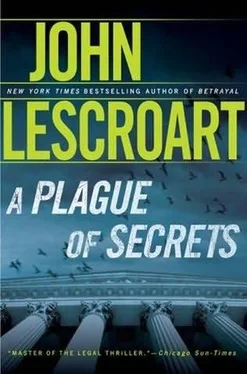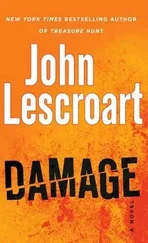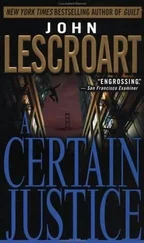“Wait a minute.” Chiurco swung his body around and sat up. “She pays Vogler ninety thousand dollars a year just so he won’t tell her husband that she had an abortion? And Vogler’s the only one who knows? I don’t think that flies.”
“I don’t know, Craig. Stranger things have happened. Maybe Vogler was the father.” Hunt pushed himself off the window ledge. “But why don’t we see what we can find out about this prison time he did, who he might have been hanging with, see if it leads us back to Maya in any way?”
“I’ll take that,” Chiurco said.
“Fine. Meanwhile, I’ll dig around and see if I can talk to somebody who remembers her from school. I talked to Diz about this yesterday and he’s a little worried, beyond everything else we’ve talked about, that if Vogler was blackmailing her, she might know something dangerous that she doesn’t know she knows. So there’s a bit of urgency.”
Chiurco was on his feet. “I’m all over it,” he said.
At a little before noon, with a full blustery fall day building up around them, Bracco and Schiff were back out in the Haight-Ashbury, this time talking to an elderly woman named Lori Bradford. They were all sitting around a small wooden table with a lace tablecloth in a nook off her kitchen. She lived on the second floor of an apartment building looking out over Ashbury, several structures up and across the street from the alley where Dylan Vogler had died.
She’d of course seen the police and the crowd last Saturday and since then had read about the murder, following the story rather closely in the newspaper. Over the last couple of days she had been trying to decide if it would be worthwhile to call somebody about a possible discrepancy that she’d noticed, and finally thought that, yes, it would be, and here they all were.
“Are you sure about this?” Schiff asked her.
“Yes. Absolutely. There were two shots, not just one.” Mrs. Bradford, in her late sixties, had dressed for her appointment with these inspectors in a pair of purple slacks over sensible black shoes, and a black turtleneck. “I thought at the time I heard them that I should have called nine one one, but then there wasn’t any more noise, and no screaming or anything like that, so I just assumed it must have been a backfire or cherry bombs or something. If it was a real emergency, someone else would have called nine one one anyway, I thought. It wasn’t that I didn’t want to get involved. People always say that, I know, that they don’t want to get involved, but I don’t have a problem with that. But I think I just convinced myself that it was probably nothing. I looked out the window there-you see how you’ve got a clear view of the first twenty or thirty feet of the alley anyway-and didn’t see anything moving. Or on the street either. And then I didn’t want to send a false alarm, which would have been worse than not calling at all. Wouldn’t it? Anyway…,” she said. And trailed off.
“Well, it’s good you called at whatever time, ma’am,” Bracco said. “But we haven’t heard anybody else talking about more than one shot.” Bracco’s face reflected his frustration with San Francisco’s laissez faire reality. This wasn’t Hunters Point, exactly, in terms of gunshots per minute, but Bracco thought it wasn’t such a high crime area that a couple of gunshots would be a completely normal event. And yet, apparently, no one among the citizenry had seen fit to rally to report them. If it wasn’t napalm, he figured, nobody paid attention.
Mrs. Bradford looked from one inspector to the other, as though soliciting their forgiveness. “Nobody else called nine one one, then?”
“No, ma’am.”
“Oh, then I really should have, shouldn’t I?”
“I wouldn’t worry about that, Mrs. Bradford,” Schiff said. “The point is that you called now and we’re here. Inspector Bracco and I will check with dispatch and see if anybody called to report these shots or make a noise complaint on Saturday morning. Maybe they didn’t think it was an emergency, and then it wouldn’t have come to us through dispatch.”
Bracco leaned forward, elbows on the table. “Could you tell us a little more about these shots, ma’am? How far apart were they spaced, for example?”
Mrs. Bradford sat back and stared off into nothing for a second or two. “I’d say about a minute. A fairly long time, anyway. They weren’t right away, one after the other. I was awake, I remember, but still in bed, when I heard the first one, and I kind of lay there wondering what that was for a while, and if I’d really heard it. You know? The way you are when you’re half awake. And then I decided I’d really heard something and got up to see if I could see what it had been and I was just in the hallway there when the second one went off.”
“And what did you do then?” Schiff asked.
“Well.” Mrs. Bradford’s face grew animated at the recollection. “Well, then, I of course got to the window as fast as I could and looked down at the street here, and I could see the alley, too, but I didn’t know that’s where the shots must have come from. I couldn’t tell anything, really. Anyway, but then when I didn’t see anybody moving and hear anything else down below there, that’s when I decided it was probably nothing and not to call nine one one.”
“Mrs. Bradford,” Schiff asked, “did you happen to notice the exact time of these shots?”
“Yes,” she said. “It was ten minutes after six. The second one, I mean. The first one, just before that. Six oh eight or nine.” She pointed. “There’s the digital on the stove.”
“And how sure are you,” Bracco asked, “that it was the same kind of sound?”
“Oh, the same, definitely. If the second one was a shot, the first one was a shot, and vice versa. Loud, and sharp. Louder than TV.” Back to her recurring theme, she said, “I really should have called nine one one. Someone might have gotten here in time to catch the killer.”
“Really, Mrs. Bradford”-Schiff patted her hand on the table-“I wouldn’t lose one minute of sleep over that. You’ve done the right thing to call us now, and this is a very important bit of information that we didn’t have before.” She cast an eye on Bracco. “This may change our entire theory of the case, and it’s all because you’re a good citizen. We thank you very much.”
On the second flight down the stairs, out of earshot, Schiff started talking about it. “You believe her?”
“I think she heard something.”
“There was only one bullet missing from the murder weapon.”
“ Maybe the murder weapon. Consistent with the murder weapon. And I kind of vaguely remember, Debra.”
“Vogler didn’t shoot somebody in that alley.”
“Nope.”
“And there was only one casing.”
“Yep.”
“Which means what?”
“It means the woman’s going on a hundred. She’s bored living alone. She heard some noises maybe the same morning Vogler was shot.”
They came out into the overcast and windy day and turned downhill toward Haight, where, even though they’d parked legally in an open metered space, Darrel had gone through his radio-over-the-rearview-mirror and business-card-on-the-dashboard routine. They were walking on the opposite side of the street from Bay Beans West, and as they came abreast of the place, Schiff hit Bracco on the arm. “Darrel,” she said, “wait up. Look at that.”
They both stopped.
“What?” Bracco asked.
“On the door.”
Bracco squinted to look, then stepped off the curb and started across the street. “What is that?”
When they came closer, the answer presented itself. Taped to the front door was an official yellow-colored single sheet of a government document with the heading “Posting of Real Property,” declaring that the establishment was subject to forfeiture to the federal government, as the proceeds of trafficking in controlled substances.
Читать дальше












